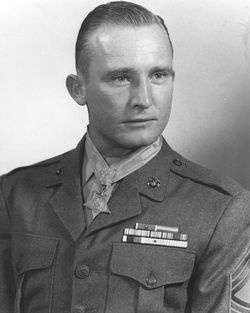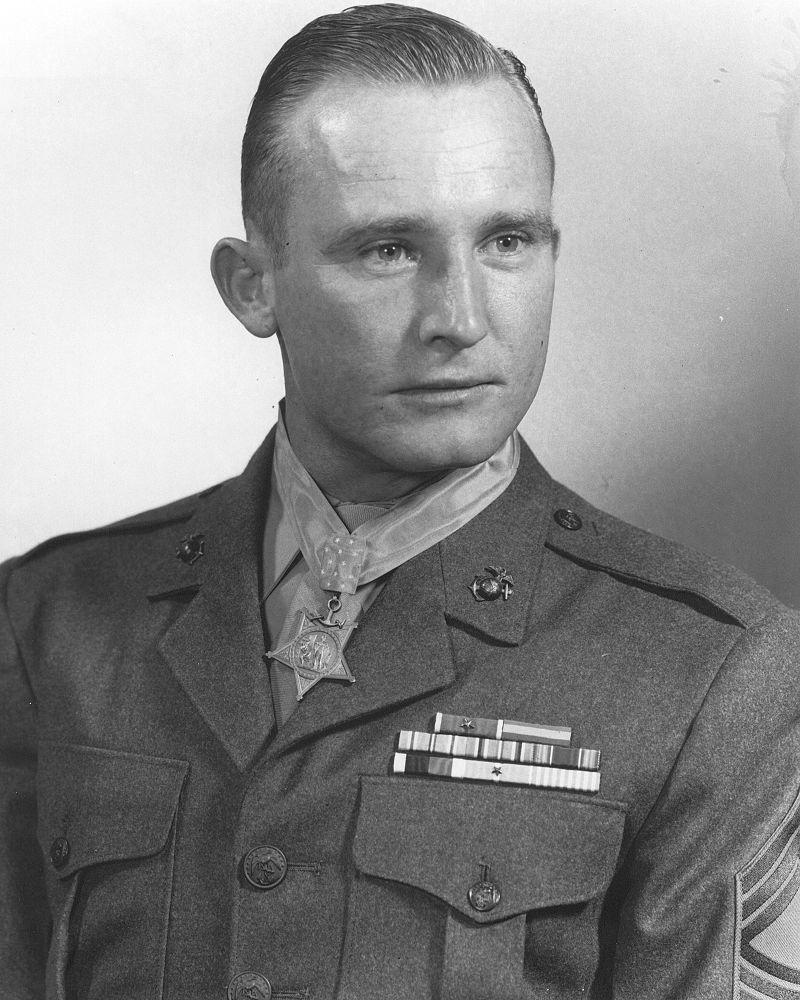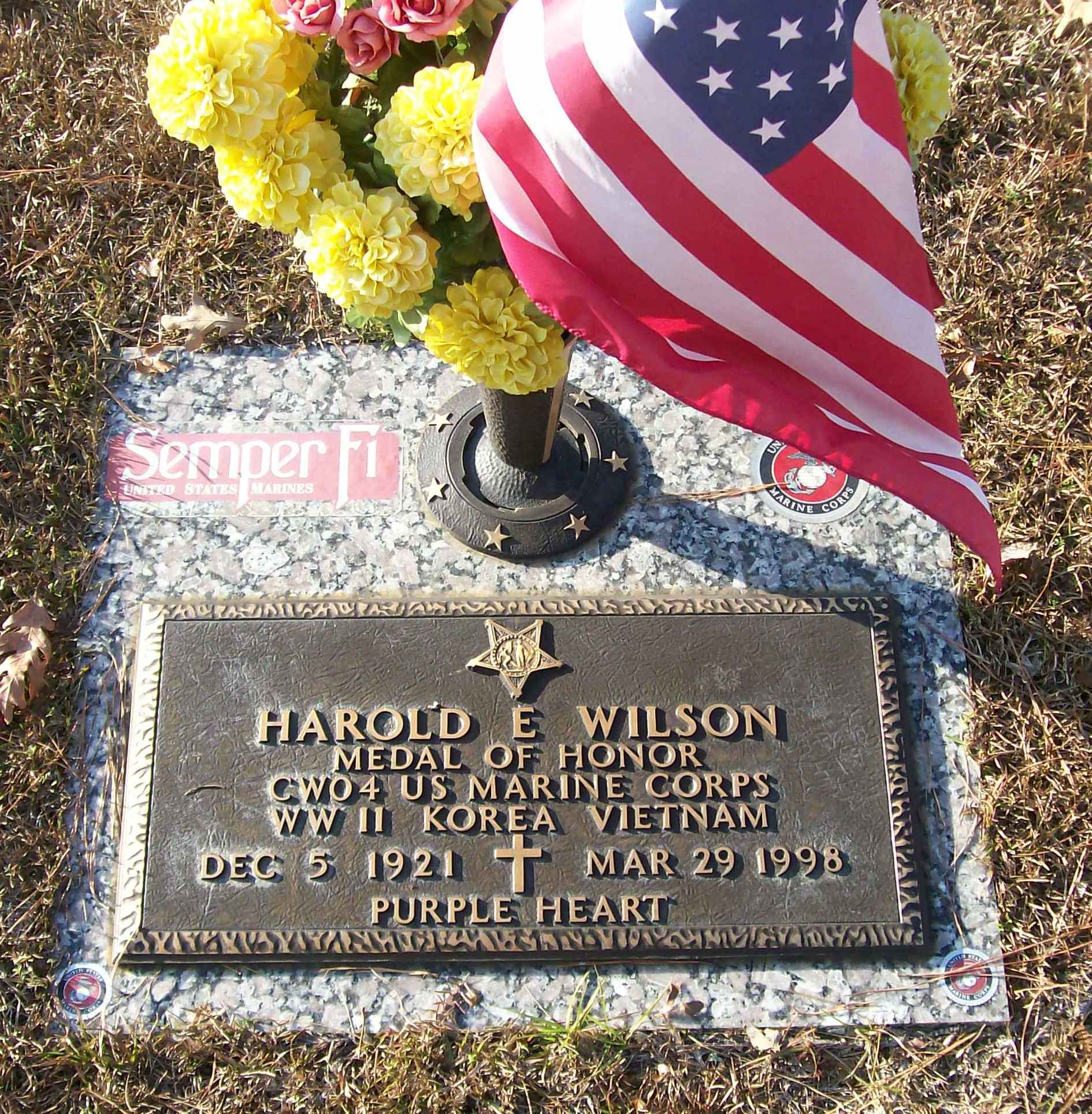Korean War Medal of Honor Recipient. He received the award from President Harry S. Truman at the White House on April 11, 1952 for his actions as a technical sergeant with Company G, 3rd Platoon, 3rd Battalion, 1st Marines, 1st Marine Division, on April 23, 1951, at the Battle of Hwacheon, South Korea. Following the US entry into World War II in December 1941, he enlisted in the US Marine Corps Reserve and in April 1942 he was assigned to active duty. During World War II, he served overseas for 27 months and was stationed on Midway Island and was honorably discharged in October 1945, at the rank of sergeant. Following the outbreak of the Korean War in 1950, he was recalled to active duty and sent to Korea. At the Battle of Hwacheon, he was wounded four times during the night-long battle, and refused medical treatment to rally his men against overwhelming enemy forces. With both arms virtually disabled, he continued to pass ammunition to his hard-pressed comrades and moved from foxhole to foxhole aiding and encouraging his men. When the assault was finally broken, he personally accounted for each of his men before walking a half mile unassisted to an aid station. He was medically evacuated for treatment of his wounds and returned to the US five months later. In August 1952 he was commissioned as a warrant officer and ten years later he became the adjutant at the Marine Corps Engineer Schools at Camp Lejeune, and the following December was assigned to Force Troops, Fleet Marine Force, Atlantic, serving as adjutant and personnel officer of the 2nd Tank Battalion. He retired from the US Marine Corps in February 1972 at the rank of chief warrant officer. Among his other military awards and decorations include the Bronze Star (with combat 'V' device, the Purple Heart (with four gold stars), and the Korean Service Medal (with three bronze stars), among others. He died at the age of 76. His Medal of Honor citation reads: "For gallantry and intrepidity at the risk of his life above and beyond the call of duty while serving as platoon sergeant of a rifle platoon attached to Company G, in action against enemy aggressor forces on the night from 23 to 24 April 1951. When the company outpost was overrun by the enemy while his platoon, firing from hastily constructed foxholes, was engaged in resisting the brunt of a fierce mortar, machine-gun, grenade, and small-arms attack launched by hostile forces from high ground under cover of darkness, T/Sgt. Wilson braved intense fire to assist the survivors back into the line and to direct the treatment of casualties. Although twice wounded by gunfire, in the right arm and the left leg, he refused medical aid for himself and continued to move about among his men, shouting words of encouragement. After receiving further wounds in the head and shoulder as the attack increased in intensity, he again insisted upon remaining with his unit. Unable to use either arm to fire, and with mounting casualties among our forces, he resupplied his men with rifles and ammunition taken from the wounded. Personally reporting to his company commander on several occasions, he requested and received additional assistance when the enemy attack became even more fierce and, after placing the reinforcements in strategic positions in the line, directed effective fire until blown off his feet by the bursting of a hostile mortar round in his face. Dazed and suffering from concussion, he still refused medical aid and, despite weakness from loss of blood, moved from foxhole to foxhole, directing fire, resupplying ammunition, rendering first aid, and encouraging his men. By his heroic actions in the face of almost certain death, when the unit's ability to hold the disadvantageous position was doubtful, he instilled confidence in his troops, inspiring them to rally repeatedly and turn back the furious assaults. At dawn, after the final attack had been repulsed, he personally accounted for each man in his platoon before walking unassisted one-half mile to the aid station where he submitted to treatment. His outstanding courage, initiative, and skilled leadership in the face of overwhelming odds were contributing factors in the success of his company's mission and reflect the highest credit upon T/Sgt. Wilson and the U.S. Naval Service."
Korean War Medal of Honor Recipient. He received the award from President Harry S. Truman at the White House on April 11, 1952 for his actions as a technical sergeant with Company G, 3rd Platoon, 3rd Battalion, 1st Marines, 1st Marine Division, on April 23, 1951, at the Battle of Hwacheon, South Korea. Following the US entry into World War II in December 1941, he enlisted in the US Marine Corps Reserve and in April 1942 he was assigned to active duty. During World War II, he served overseas for 27 months and was stationed on Midway Island and was honorably discharged in October 1945, at the rank of sergeant. Following the outbreak of the Korean War in 1950, he was recalled to active duty and sent to Korea. At the Battle of Hwacheon, he was wounded four times during the night-long battle, and refused medical treatment to rally his men against overwhelming enemy forces. With both arms virtually disabled, he continued to pass ammunition to his hard-pressed comrades and moved from foxhole to foxhole aiding and encouraging his men. When the assault was finally broken, he personally accounted for each of his men before walking a half mile unassisted to an aid station. He was medically evacuated for treatment of his wounds and returned to the US five months later. In August 1952 he was commissioned as a warrant officer and ten years later he became the adjutant at the Marine Corps Engineer Schools at Camp Lejeune, and the following December was assigned to Force Troops, Fleet Marine Force, Atlantic, serving as adjutant and personnel officer of the 2nd Tank Battalion. He retired from the US Marine Corps in February 1972 at the rank of chief warrant officer. Among his other military awards and decorations include the Bronze Star (with combat 'V' device, the Purple Heart (with four gold stars), and the Korean Service Medal (with three bronze stars), among others. He died at the age of 76. His Medal of Honor citation reads: "For gallantry and intrepidity at the risk of his life above and beyond the call of duty while serving as platoon sergeant of a rifle platoon attached to Company G, in action against enemy aggressor forces on the night from 23 to 24 April 1951. When the company outpost was overrun by the enemy while his platoon, firing from hastily constructed foxholes, was engaged in resisting the brunt of a fierce mortar, machine-gun, grenade, and small-arms attack launched by hostile forces from high ground under cover of darkness, T/Sgt. Wilson braved intense fire to assist the survivors back into the line and to direct the treatment of casualties. Although twice wounded by gunfire, in the right arm and the left leg, he refused medical aid for himself and continued to move about among his men, shouting words of encouragement. After receiving further wounds in the head and shoulder as the attack increased in intensity, he again insisted upon remaining with his unit. Unable to use either arm to fire, and with mounting casualties among our forces, he resupplied his men with rifles and ammunition taken from the wounded. Personally reporting to his company commander on several occasions, he requested and received additional assistance when the enemy attack became even more fierce and, after placing the reinforcements in strategic positions in the line, directed effective fire until blown off his feet by the bursting of a hostile mortar round in his face. Dazed and suffering from concussion, he still refused medical aid and, despite weakness from loss of blood, moved from foxhole to foxhole, directing fire, resupplying ammunition, rendering first aid, and encouraging his men. By his heroic actions in the face of almost certain death, when the unit's ability to hold the disadvantageous position was doubtful, he instilled confidence in his troops, inspiring them to rally repeatedly and turn back the furious assaults. At dawn, after the final attack had been repulsed, he personally accounted for each man in his platoon before walking unassisted one-half mile to the aid station where he submitted to treatment. His outstanding courage, initiative, and skilled leadership in the face of overwhelming odds were contributing factors in the success of his company's mission and reflect the highest credit upon T/Sgt. Wilson and the U.S. Naval Service."
Bio by: William Bjornstad
Inscription
Medal of Honor
CWO4 US MARINE CORPS
WWII KOREA VIETNAM
Purple Heart
Family Members
Advertisement
See more Wilson memorials in:
Explore more
Sponsored by Ancestry
Advertisement









